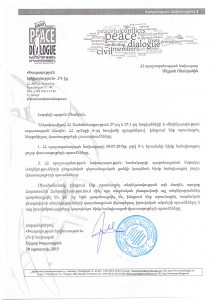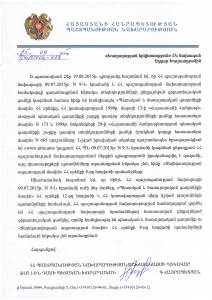The challenge of the cause of death of Private Haroutyun Hambaryan was rejected.
In May 2015, during the preliminary investigation of the criminal case as to the cause of death of Private Haroutyun Hambaryan, his father, Hrayr Hambaryan, asked Peace Dialogue NGO for their assistance as he did not agree with the official version of his son’s death.
Mr. Hambaryan believes that a biased and false investigation was carried out accompanied by gross violations of Article 17, Point 3 of the Criminal Code which ensures comprehensive and objective investigation. In a complaint addressed to the Head of the RA Criminal Investigative Committee Aghvan Hovsepyan as well as to the head of the 3rd garrison of the RA Investigative Committee, the Prosecutor General and the Ombudsman. According to the victim’s father, the investigative body from the very beginning qualified the murder as a suicide, conducted a biased investigation by concealing or distorting the facts and seeks to “prove” by any means that it was in fact a suicide.
According to Private Davit Haroutyunyan’s testimony, not long before the incident Private Hambaryan had a serious confrontation with his fellow servicemen, particularly with Hovhannes Melkonyan and Smbat Hayrapetyan during which while defending himself he even tried to stab Smbat Hairapetyan. The preliminary investigative body attempted to ignore this most important fact. Smbat Hairapetyan was not subjected to forensic examination until after the persistent requests of David Harutyunyan’s defender. According to expert opinion many scars were indeed found on Smbat Hayrapetyan’s right and left hands, including injuries caused by a sharp object.
Hrair Hambaryan insists that his son was very strong and would never let anyone hurt him or put pressure on him. Once in a phone conversation with his sister he even said that he had a conflict with some soldiers but he managed to resist them.
The preliminary investigative body was not willing to carry out an objective and thorough investigation. Although it has been seven months since the incident the investigative body still has not provided the ballistic and fingerprint experts reports on the weapons claiming that they have not yet been received.
Meanwhile, the investigator, N. Avetisyan denied a motion to send the victim’s clothes for fingerprint examination saying that it would take a long time for that and the criminal case may be delayed for years. The same investigator rejected the motion to send the victim’s clothes for forensic chemical and forensic biological examination saying that it is groundless and will provide nothing. All this is blatantly illegal and goes to show the interest of the preliminary investigative body’s interest only, not the deceased or his families.
According to the forensic expert’s opinion, Private Hambaryan was shot from the distance of one meter, however the investigator still insists that he put the rifle on his forehead and shot himself. The same expert opinion also indicates traces of scratches and hematoma on the left temporal region which were caused by a blunt object while he was still alive. The investigators did nothing to find out who had hit him.
The victim’s father put all these facts into his complaint and expressed his bewilderment over the inaction of the relevant bodies. In addition, he challenged the head of the 3rd garrison department, the investigators and the prosecutor in control of the department and inquired about handing the criminal case to another investigative department and ask for a new, objective and comprehensive investigation to be carried out.
The challenge however was rejected by the RA Military Prosecutor A. Haroutyunyan.
The expert of Peace Dialogue NGO Ruben Martirosyan immediately found some vivid “irregularities.” Despite the eight-page detailed report of different injuries and traces on Smbat Hayrapetyan’s hand and their causes such as cutting grass, digging trenches, playing with cats and punching the wall for no reason, the investigator did not question the expert on the possible ways of obtaining such injuries and simply “believed” the defendant and despite the severity of the injuries, “did not exclude” that the victim could have obtained them in daily life. It is also not clear why the results of ballistic and fingerprint examinations of the weapon and the ballistic examination of the clothes that were assigned on May 9, shortly after the incident had not been received although it had been six months since then they were requested.
It is even more surprising that despite the lack of results from the examinations the preliminary investigative body considers it a proven fact that it was a suicide and that the suicide weapon was the deceased soldier’s rifle.
The report touched upon the direction of the rifle and how the shot was made but only mentioned the words of the victim’s successor without explaining how it was possible to commit a suicide pointing the rifle in the head from top to down.
The rejection letter does not even say that the preliminary investigative body refused to carry out ballistic and forensic chemical and biological examinations of the victim’s clothes, although according to expert Rouben Martirosyan it is not acceptable and that this fact suggests that it was done in order to take the investigation to the wrong way and justify the suicide hypothesis. The results of all these examinations would simply show that before the death violence was used against the victim.
Posted: June 17th, 2016 under News.
Comments: none




